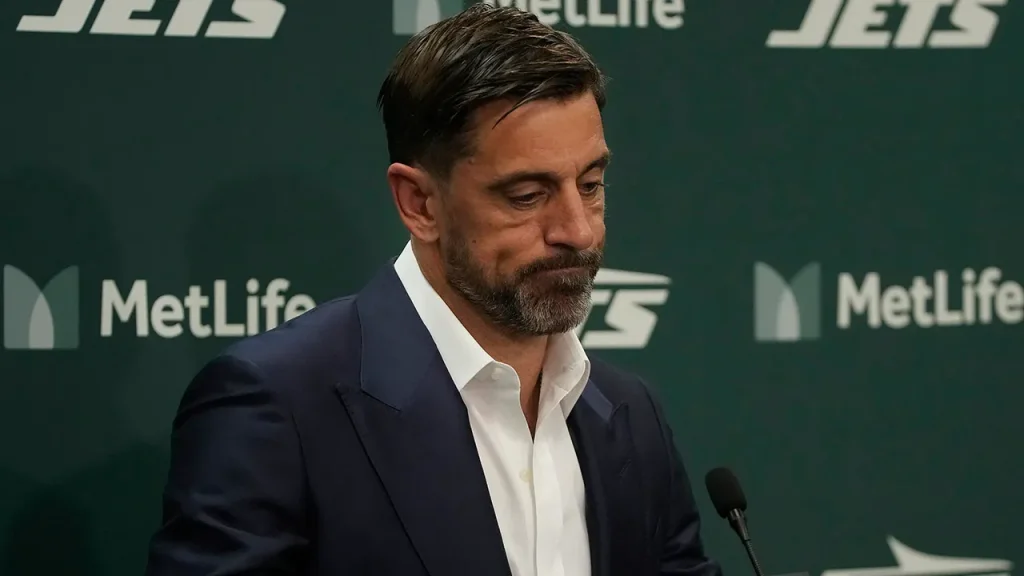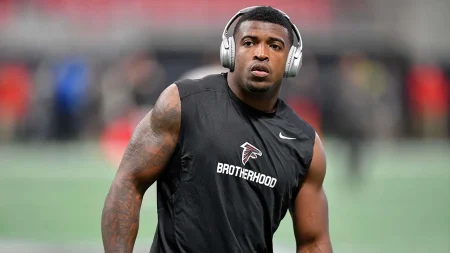Aaron Rodgers’ Contemplative Farewell: A Potential End to a Storied NFL Career
Aaron Rodgers, the seasoned quarterback of the New York Jets, finds himself at a crossroads, contemplating the potential end of his illustrious NFL journey. Following a disappointing season marred by injuries and team struggles, Rodgers acknowledged the possibility that Sunday’s game against the Miami Dolphins could be his last. This revelation, while not a definitive declaration of retirement, underscores the uncertainty surrounding his future and reflects the significant changes anticipated within the Jets organization.
Rodgers’ tenure with the Jets has been a stark contrast to his successful years with the Green Bay Packers. After joining the Jets in 2023, he suffered a season-ending Achilles injury in the very first game, sidelining him for the remainder of the season. This year, despite returning to full health, Rodgers and the Jets have struggled, culminating in a dismal 4-12 record. The team’s underperformance, coupled with the impending changes in coaching and management, has prompted Rodgers to reflect on his future in the league.
The Jets’ anticipated overhaul in leadership adds another layer of complexity to Rodgers’ decision. With the current regime of Robert Saleh and Joe Douglas being replaced, the incoming general manager and head coach will have the weighty responsibility of charting the team’s future course, including determining Rodgers’ role. Rodgers, aware of this impending shift, expects a swift decision from the new leadership regarding his place within the team. This acknowledgment suggests a sense of acceptance and a willingness to embrace whatever the future holds, whether it involves continuing with the Jets or pursuing other avenues.
Rodgers’ contemplation extends beyond the immediate future of his NFL career. He acknowledges the physical toll the game has taken on his body, particularly referencing the record number of sacks he has endured. Having surpassed Tom Brady for the most sacks in NFL history, Rodgers has faced relentless pressure from opposing defenses, a testament to his longevity and resilience. This physical burden, coupled with the team’s struggles, contributes to the introspective mood surrounding his potential retirement.
Despite the challenges and disappointments, Rodgers expresses profound gratitude for his time with the Jets. He describes the past two years as the best of his life, emphasizing the personal growth and relationships he has cultivated within the organization. This sentiment reveals a shift in perspective, a recognition that the game encompasses more than just wins and losses. The camaraderie, the bonds with teammates and staff, the shared experiences – these are the elements that have enriched Rodgers’ life and shaped his outlook. This appreciation for the human connections within the sport suggests that even if he chooses to retire, he will cherish the memories and relationships forged during his time with the Jets.
Rodgers’ potential departure marks a significant turning point for both the player and the Jets franchise. His arrival in New York generated considerable excitement and expectations, but the on-field results have fallen far short of those aspirations. As Rodgers contemplates his next move, the Jets must grapple with the implications of losing a veteran quarterback and the uncertainty surrounding their future direction. Ultimately, Rodgers’ decision will reverberate throughout the league, impacting not only the Jets but also the landscape of professional football. His legacy, already cemented as one of the most talented quarterbacks in NFL history, will be further defined by the choices he makes in the coming months.










